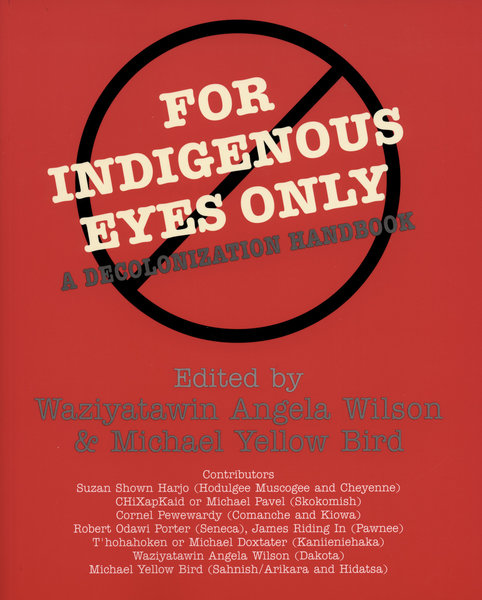For Indigenous Eyes Only
A Decolonization Handbook
Edited by Waziyatawin Angela Wilson and Michael Yellow Bird
Recognizing an urgent need for Indigenous liberation strategies, Indigenous intellectuals met to create a book with hands-on suggestions and activities to enable Indigenous communities to decolonize themselves. The authors begin with the belief that Indigenous Peoples have the power, strength, and intelligence to develop culturally specific decolonization strategies for their own communities and thereby systematically pursue their own liberation. These scholars and writers demystify the language of colonization and decolonization to help Indigenous communities identify useful concepts, terms, and intellectual frameworks in their struggles toward liberation and self-determination. This handbook covers a wide range of topics, including Indigenous governance, education, language, oral tradition, repatriation, images and stereotypes, and truth-telling. It aims to facilitate critical thinking while offering recommendations for fostering community discussions and plans for meaningful community action.
2005. 224 pp., 4 figures, activities, suggested readings, index, 8 x 10
Contributors: T’hohahoken Michael Doxtater, Suzan Shown Harjo, Chi’XapKaid Michael Pavel, Cornel Pewewardy, Robert Odawi Porter, James Riding In, Waziyatawin Angela Wilson, Michael Yellow Bird
Awards: 2007 New Mexico Book Award Finalist
Download an excerpt.
—Rebecca Weaver-Hightower, North Dakota Quarterly, Vol. 74, no. 2 (Spring 2007)
“Buy this book in quantity; share it; give it away; and use it to change the world … The greatness lies in the authors’ willingness to tackle the tough issues of today … The book represents the best in scholarship: a compassion for the people and the hope that education can serve the people through liberation.”
—Michael W. Simpson, Tribal College Journal of American Indian Higher Education Vol. 19, no. 2 (Winter 2007)
- Beginning Decolonization
Waziyatawin and Michael Yellow Bird - Tribal Critical Thinking Centers
Michael Yellow Bird - Just Good Sports: The Impact of “Native” References in Sports on Native Youth and What Some Decolonizers Have Done About It
Suzan Shown Harjo - Decolonizing Indigenous Diets
Waziyatawin - The Decolonization of Indigenous Governance
Robert Odawi Porter - Defying Colonization Through Language Survival
Waziyatawin - Decolonizing Through Storytelling
Chi’XapKaid - Ideology, Power, and the Miseducation of Indigenous Peoples in the United States
Cornel Pewewardy - Organizing Indigenous Governance to Invent the Future
T’hohahoken - Decolonizing Tribal Enrollment
Michael Yellow Bird - Relieving Our Suffering: Indigenous Decolonization and a United States Truth Commission
Waziyatawin
